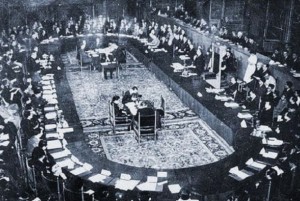By Alwi Shahab
It is widely known that the Netherlands received various amenities while occupying the Indonesian archipelago. For more than 3.5 centuries of the Dutch power in the Indies (Indonesia), cash crops, minerals, and various other products were transported out of this country which were then marketed to Europe, America, and other world markets.
In 1942, Japan made the Dutch surrendered in Indonesia. Unfortunately, not many people know how the Dutch was able to rebuild itself from the heavy damage after World War II with the help of Indonesia.
It was decided in the Round Table Conference in The Hague, in December 1949, that the Dutch would receive 4.5 billion guilders from Indonesia in return for the handover of sovereignty. Lambert Gielbels, a Dutch historian, in an essay quoted by a newspaper revealed that in fact the Netherlands demanded 6.5 billion guilders ransom. This means that the money used to oppress the people of Indonesia, including with two military aggression during the physical revolution, must be paid for the new Indonesian government.
At that time Indonesia had paid 4 billion guilders to the Dutch. Then the question is, why should Indonesia pay the Dutch and not vice versa? The Indonesian government itself had never demanded an apology for the atrocities and repressions committed by the Dutch during 350 years of colonization, let alone demanded compensations.
However, there are many people in the Netherlands who asked their government to apologize to Indonesia. Indeed, some have argued that apology is not enough for the loss and suffering of Indonesia as a result of the long occupation, which can not be forgotten just by apology.
When tried before the colonial court in Bandung, on August 18, 1930, Bung Karno revealed the atrocities of the Dutch. Bung Karno who was 29 years at that time, sued the Dutch colonial policy, including the exploitation of 70 percent of the agricultural and mining of Indies which were rushed to the country. For Indonesian, both “old” imperialism and “modern” imperialism sucked up the Indonesian produce.
Regarding the forced cultivation system imposed by Governor General van der Bosh and his successors, Bung Karno also sued his action. Van der Bosh, because the money from this system had increased the finance of the colonial government, received a peerage of Graaf, a very high degree of the Kingdom of the Netherlands. In fact, he danced on top of the dead body of thousands of Indonesian people who died in their own fertile land.
Eduard Douwes Dekker also known as Multatuli, a Dutch Resident Assistant in Lebak, attacked his own country as a result of this unjust system.
Willard A. Hanna, a former head of the US Information Office in Jakarta in Jakarta his book Hikayat Jakarta ( A Tale of Jakarta) revealed the huge exports from the Dutch East Indies during World War I, namely more than 1 billion dollars per year in the form of raw materials.
Source : HTI Website
 Hizbut Tahrir Indonesia Melanjutkan Kehidupan Islam
Hizbut Tahrir Indonesia Melanjutkan Kehidupan Islam

